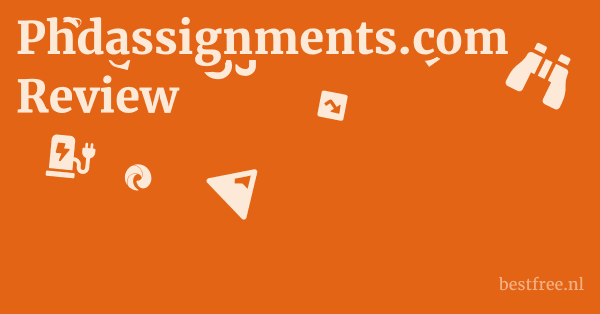This involves looking for specific indicators of transparency, professional conduct, and adherence to ethical educational standards.
Read more about phdassignments.com:
Phdassignments.com Review: An Ethical Stance on Academic Integrity
Phdassignments.com Review & First Look
Phdassignments.com: The Ethical Disadvantages
Is Phdassignments.com Legit? Examining Credibility and Transparency
Phdassignments.com Pricing & Value Proposition
Is Phdassignments.com a Scam?
How to Avoid Unethical Assignment Services
Check for Clear and Transparent Business Information
A truly legitimate service will not hide behind anonymity.
They will be upfront about who they are and where they operate.
- Physical Address and Contact Information: Look for a clearly stated physical business address, not just a PO box. A professional service will also provide a direct phone number and multiple avenues for contact (email, chat, support tickets).
- Example: A transparent “Contact Us” page should include a physical address and customer service phone numbers, ideally with business hours.
- Company Registration Details: If possible, search for the company’s registration details in their stated country of operation. Most countries have public business registries where you can verify if a company is legally registered.
- Verification: For a UK-based company, check Companies House. for a US company, look for state-level business registration.
- Professional Website: While not a guarantee, a legitimate service typically invests in a professional, well-maintained website that is free of blatant grammatical errors, broken links, or contradictory information (like phdassignments.com’s “0 customers served” claim).
- Secure Connection: Ensure the website uses HTTPS (secure connection) to protect your data.
Assess the Service Offering and Ethical Stance
This is the most critical step, especially when differentiating between genuine academic support and contract cheating services.
- Focus on Skill Development, Not Completion: A legitimate academic support service focuses on helping you learn and improve your own work, not on doing the work for you.
- Examples of Legitimate Services: Tutoring, writing center consultations, study skills workshops, grammar and citation checkers (for your work), proofreading services (that suggest changes, not rewrite).
- Red Flag Phrases: Watch out for phrases like “write my essay,” “do my assignment,” “exam help,” or “custom paper writing for submission.” These are clear indicators of contract cheating.
- Clear Policies Against Academic Misconduct: Reputable services will explicitly state their stance against plagiarism and academic dishonesty, encouraging students to use their services ethically (e.g., for understanding, not submission).
- Disclaimers: They might have disclaimers about how their services should be used (e.g., as study aids, not for direct submission).
- No Guarantees of Grades: A legitimate tutor or writing coach cannot guarantee a specific grade, as that depends on the student’s learning and performance. Services that guarantee high grades are often misleading.
Examine Reviews and Reputation
Beyond the company’s self-promotion, look for independent verification of their claims.
- Third-Party Review Platforms: Check reputable independent review websites like Trustpilot, Google Reviews, Sitejabber, or even academic forums. Look for a large volume of recent reviews and pay attention to both positive and negative feedback.
- Authenticity: Be wary of sites with only overwhelmingly positive, generic reviews, or those that seem to be posted in rapid succession.
- Negative Feedback: How a company responds to negative feedback can also be very telling.
- Academic Endorsements or Partnerships: While rare for private tutoring companies, university writing centers or departmental tutoring services often have explicit endorsements or are directly affiliated with the institution.
- Media Presence: Search for news articles, reputable blog mentions, or academic discussions about the service. Absence of any substantial external footprint can be a red flag.
Evaluate Professional Credentials and Transparency of Staff
If a service claims to have “expert” tutors or writers, there should be some way to verify those claims. How to Avoid Unethical Assignment Services
- Verifiable Qualifications: Tutors or coaches should have demonstrable qualifications in their fields. Look for links to their academic profiles, professional certifications, or publications.
- Transparent Hiring Process: A good tutoring service will describe its hiring process for tutors, including background checks and qualifications.
- Direct Communication with Tutors: Legitimate tutoring services typically allow direct communication between the student and the tutor to ensure clear understanding and personalized support.
By systematically applying these verification steps, students can significantly reduce the risk of engaging with unethical services and instead find genuine, legitimate academic support that truly aids their learning journey.
|
0.0 out of 5 stars (based on 0 reviews)
There are no reviews yet. Be the first one to write one. |
Amazon.com:
Check Amazon for How to Verify Latest Discussions & Reviews: |

Leave a Reply